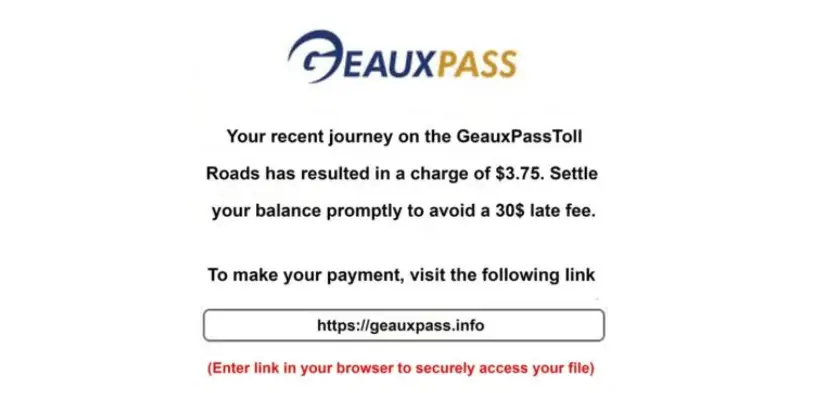Scammers are targeting GeauxPass users with fake texts claiming they owe unpaid tolls. These messages contain links to fraudulent websites designed to steal personal and financial information.
This article explains how the GeauxPass Toll Text Scam works and what to do if you fall victim.

What is GeauxPass Toll Text Scam?
The GeauxPass Toll Text Scam mainly targets Louisiana residents but is spreading. Scammers pose as the GeauxPass agency, sending texts claiming unpaid tolls and urging quick payment to avoid fees.
The Louisiana DOTD warns that GeauxPass never requests personal information via text, and any such message is a scam.
How GeauxPass Toll Text Scam Works?
Scammers send messages to random numbers, targeting anyone, even non-GeauxPass users, aiming to catch people off guard. These texts appear official, using familiar language and branding similar to GeauxPass, claiming unpaid tolls and urging immediate payment to avoid extra fees, creating a false sense of urgency.
The messages include links to fake websites that closely mimic the real GeauxPass site, often using slight URL changes to deceive users. These sites ask for sensitive information, which scammers use for identity theft or financial fraud.
By mimicking official communications, the scammers’ professional-looking messages and websites can fool those unfamiliar with GeauxPass’s actual procedures. Once victims provide their details, scammers steal them for unauthorized charges or other financial crimes.
Do This If You Fall for GeauxPass Toll Text Scam
If you’ve fallen victim to the GeauxPass Toll Text Scam or a similar scam, follow these steps to protect yourself:
- Confirm any toll claims by visiting the official GeauxPass website or contacting their customer service at 866-662-8987. Avoid using any contact details provided in the suspicious message, as they could be fraudulent.
- If you believe you’ve been targeted, report the incident to the Internet Crime Complaint Center (IC3) at ic3.gov, including the sender’s phone number and any links you received.
- If you’ve shared sensitive information, review your bank and credit card statements for unauthorized charges. Report any suspicious activity to your bank and consider freezing your accounts to prevent further harm.
READ MORE —–